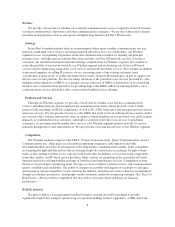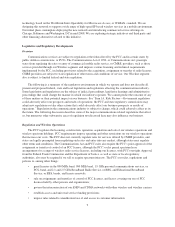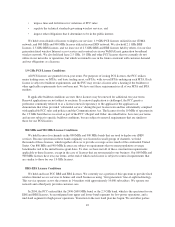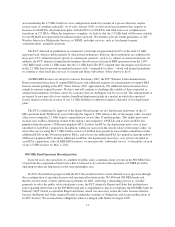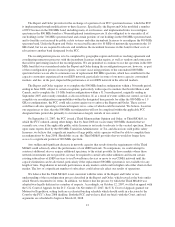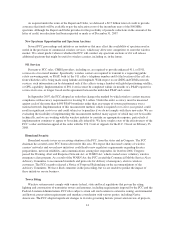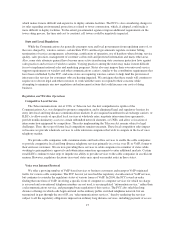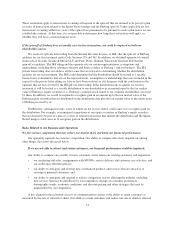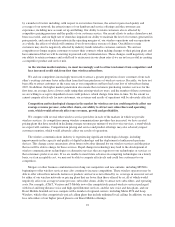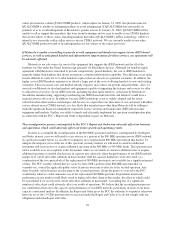Sprint - Nextel 2007 Annual Report Download - page 20
Download and view the complete annual report
Please find page 20 of the 2007 Sprint - Nextel annual report below. You can navigate through the pages in the report by either clicking on the pages listed below, or by using the keyword search tool below to find specific information within the annual report.including us, can receive. Further restrictions on our ETC status at the federal and state levels could result in the
rescission of our ETC status, and a group of rural LECs has challenged our ETC designation in Virginia. We
demonstrated that this challenge was without merit, and to date, no action has been taken. The Federal-State Joint
Board on Universal Service has recommended significant changes to the federal USF, including a cap on USF
support to competitive ETCs, and establishment of separate mobility, broadband, and “provider of last resort”
funds. The FCC has sought comment on these proposals, as well as other proposals to limit the size of the fund.
If adopted by the FCC as proposed, these changes would likely reduce our ETC universal service support, with
little or no reduction in our USF contribution obligations.
Electronic Surveillance Obligations
The CALEA requires telecommunications carriers, including us, to modify equipment, facilities and
services to allow for authorized electronic surveillance based on either industry or FCC standards. Our CALEA
obligations have been extended to data and VoIP networks, and we are in compliance with these requirements.
Certain laws and regulations require that we assist various government agencies with electronic surveillance of
communications and records concerning those communications. We are a defendant in four purported class
action lawsuits that allege that we participated in a program of intelligence gathering activities for the federal
government following the terrorist attacks of September 11, 2001 that allegedly violated federal and state law.
Relief sought in these cases includes injunctive relief, statutory and punitive damages, and attorneys’ fees. We
believe these suits have no merit. We do not disclose customer information to the government or assist
government agencies in electronic surveillance unless we have been provided a lawful request for such
information.
Privacy-Related Regulations
We comply with FCC customer proprietary network information, or CPNI, rules, which require carriers to
comply with a range of marketing and safeguard obligations. These obligations focus on carriers’ access, use,
storage and disclosure of CPNI. In 2007, the FCC adopted a new CPNI Order that imposed additional CPNI
obligations on carriers. The new CPNI rules took effect in December 2007. We are utilizing a variety of
compliance vehicles, such as technical and systematic solutions and updated policies and procedures, to conform
our operations to the new CPNI obligations. The technical and systematic solutions offer significant data security
benefits, but they also require significant development and testing. We petitioned the FCC for a limited waiver of
some new CPNI rules so that we could complete development, testing and deployment of our CPNI compliance
solutions. No opposition comments were filed in response to our petition. We also continue to monitor our CPNI
compliance program and make enhancements and improvements when necessary.
Emergency Backup Power Rules
In October 2007, the FCC adopted rules that require wireless carriers to have eight hours of backup power at
their cell sites and remote terminals. Wireless carriers may be able to exclude some of these facilities from the
requirement if they can demonstrate in a report to be filed with the FCC within six months after the rules become
effective that the installation of the equipment necessary to comply with the eight-hour back-up rules, e.g.,
generators or batteries, presents a risk to safety, life or health; is precluded by private legal obligation or
agreement; or is precluded by Federal, state, tribal or local law. For those facilities that do not fall within one of
these exclusions, wireless carriers are required to bring such facilities into compliance with the back-up power
rules within twelve months from the effective date of the rules or file with the FCC a certified emergency backup
power compliance plan detailing how the wireless carrier intends to meet the backup power requirements. The
rules are not yet in effect. Assuming that compliance is even possible, which is not likely, such compliance with
the rules could result in significant costs to us. We have requested and been granted a stay of the rules by the U.S.
Court of Appeals for the District of Columbia, and we, CTIA-The Wireless Association®and USA Mobility have
filed Petitions for Review of the rules at the same Court. The FCC recently consented to expedited review of the
Petitions for Review so it is likely that the Court will act by the middle of 2008.
Environmental Compliance
Our environmental compliance and remediation obligations relate primarily to the operation of standby
power generators, batteries and fuel storage for our telecommunications equipment. These obligations require
18


